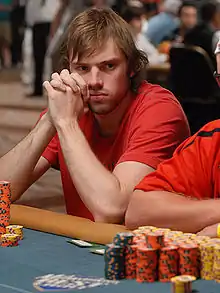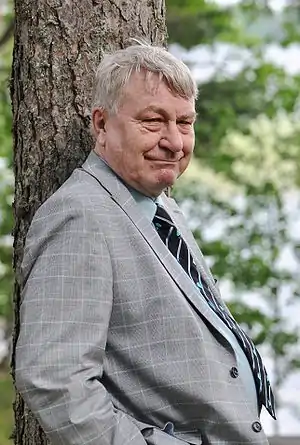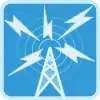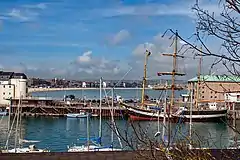Portal:Europe

| Main | Geography | Projects |
|
|
Europe is a continent located entirely in the Northern Hemisphere and mostly in the Eastern Hemisphere. It comprises the westernmost peninsulas of the continental landmass of Eurasia, and is bordered by the Arctic Ocean to the north, the Atlantic Ocean to the west, the Mediterranean Sea to the south, and Asia to the east. Europe is commonly considered to be separated from Asia by the watershed of the Ural Mountains, the Ural River, the Caspian Sea, the Greater Caucasus, the Black Sea, and the waterways of the Turkish Straits. Although much of this border is over land, Europe is generally accorded the status of a full continent because of its great physical size and the weight of history and tradition.
Europe covers about 10,180,000 km2 (3,930,000 sq mi), or 2% of the Earth's surface (6.8% of land area), making it the second smallest continent (using the seven-continent model). Politically, Europe is divided into about fifty sovereign states, of which Russia is the largest and most populous, spanning 39% of the continent and comprising 15% of its population. Europe had a total population of about 741 million (about 11% of the world population), as of 2018. The European climate is largely affected by warm Atlantic currents that temper winters and summers on much of the continent, even at latitudes along which the climate in Asia and North America is severe. Further from the sea, seasonal differences are more noticeable than close to the coast.
The history of Europe concerns itself with the discovery and collection, the study, organization and presentation and the interpretation of past events and affairs of the people of Europe since the beginning of written records. During the Neolithic era and the time of the Indo-European migrations, Europe saw human inflows from east and southeast and subsequent important cultural and material exchange. The period known as classical antiquity began with the emergence of the city-states of ancient Greece. Later, the Roman Empire came to dominate the entire Mediterranean basin. The fall of the Roman Empire in AD 476 traditionally marks the start of the Middle Ages. Beginning in the 14th century a Renaissance of knowledge challenged traditional doctrines in science and theology. Simultaneously, the Protestant Reformation set up Protestant churches primarily in Germany, Scandinavia and England. After 1800, the Industrial Revolution brought prosperity to Britain and Western Europe. The main European powers set up colonies in most of the Americas and Africa, and parts of Asia. In the 20th century, World War I and World War II resulted in massive numbers of deaths. The Cold War dominated European geo-politics from 1947 to 1989. After the fall of the Iron Curtain, the European countries grew together.
The culture of Europe is rooted in the art, architecture, film, different types of music, economic, literature, and philosophy that originated from the continent of Europe. European culture is largely rooted in what is often referred to as its "common cultural heritage".
The economy of Europe comprises more than 744 million people in 50 countries. The formation of the European Union (EU) and in 1999, the introduction of a unified currency, the Euro, brings participating European countries closer through the convenience of a shared currency and has led to a stronger European cash flow. The difference in wealth across Europe can be seen roughly in former Cold War divide, with some countries breaching the divide (Greece, Estonia, Portugal, Slovenia and the Czech Republic). Whilst most European states have a GDP per capita higher than the world's average and are very highly developed (Liechtenstein, Luxembourg, Monaco, Andorra, Norway, Sweden, Denmark, Netherlands, Switzerland, United Kingdom, Ireland, Germany), some European economies, despite their position over the world's average in the Human Development Index, are poorer.
Featured article -

The World Series of Poker Europe (WSOPE) is the first expansion effort of World Series of Poker-branded poker tournaments outside the United States. Since 1970, participants have had to travel to Las Vegas if they wanted to compete in the World Series of Poker (WSOP). Although the WSOP held circuit events in other locations, the main tournaments, which awarded bracelets to the winners, were exclusively held in Las Vegas. The inaugural WSOPE, held in 2007, marked the first time that a WSOP bracelet was awarded outside Las Vegas.
In 2004, Harrah's Casinos purchased the rights to the WSOP label. Harrah's later purchased London Clubs International (LCI). LCI operates three casinos in the London area—Fifty, Leicester Square, and The Sportsman. After the purchase of these casinos, Harrah's decided to expand its WSOP label into Europe. European casinos typically have a different environment than those in the U.S. Jeffrey Pollack, the WSOP Commissioner, indicated that the WSOPE would have a "style and flair that is both unique and appropriate to the setting. So don't be surprised if we require participants to wear blazers at the tables. If James Bond were hosting a poker tournament it may look like the World Series of Poker Europe." (Full article...)Featured location -
Weymouth (/ˈweɪməθ/ WAY-məth) is a sea-side town and civil parish in the Dorset district, in the ceremonial county of Dorset, on the English Channel coast of England. Situated on a sheltered bay at the mouth of the River Wey, 11 km (7 mi) south of the county town of Dorchester, Weymouth had a population of 53,427 in 2021. It is the third-largest settlement in Dorset after Bournemouth and Poole. The greater Weymouth urban area has a population of 72,802.
The history of the town stretches back to the 12th century and includes roles in the spread of the Black Death, the settlement of the Americas and the development of Georgian architecture. It was a major departure point for the Normandy Landings during World War II. Prior to local government reorganisation in April 2019, Weymouth formed a borough with the neighbouring Isle of Portland. Since then the area has been governed by Dorset Council. Weymouth, Portland and the Purbeck district are in the South Dorset parliamentary constituency. (Full article...)Featured portrait
 Vexi Salmi |
In the News
- 20 March 2022 – Russo-Ukrainian War
- 2022 Russian invasion of Ukraine
- The city council of Mariupol claims that Russian forces have forcefully deported "several thousand" people to camps and remote cities in Russia. (Reuters) (CNN)
- 19 March 2022 – Russo-Ukrainian War
- 2022 Russian invasion of Ukraine
- Russia uses the Kh-47M2 Kinzhal hypersonic missile for the first time in Ukraine to destroy a weapons storage in the Ivano-Frankivsk region. (Reuters)
- 19 March 2022 – Nuclear program of Iran
- Irish Minister for Foreign Affairs Simon Coveney says that an agreement to restore the 2015 Iran nuclear deal could be reached within 48 hours. (Mehr News)
- 18 March 2022 – Russo-Ukrainian War
- 2022 Russian invasion of Ukraine
Updated: 7:33, 20 March 2022
Categories
![]()
Featured biography -
Joan of Arc (French: Jeanne d'Arc [ʒan daʁk]; Middle French: Jehanne d'Arc [ʒəˈãnə ˈdark]; c. 1412 – 30 May 1431) is a patron saint of France, honored as a defender of the French nation for her role in the siege of Orléans and her insistence on the coronation of Charles VII of France during the Hundred Years' War. Claiming to be acting under divine guidance, she became a military leader who transcended gender roles and gained recognition as a savior of France.
Joan was born to a propertied peasant family at Domrémy in northeast France. In 1428, she requested to be taken to Charles, later testifying that she was guided by visions from the archangel Michael, Saint Margaret, and Saint Catherine to help him save France from English domination. Convinced of her devotion and purity, Charles sent Joan, who was about seventeen years old, to the siege of Orléans as part of a relief army. She arrived at the city in April 1429, wielding her banner and bringing hope to the demoralized French army. Nine days after her arrival, the English abandoned the siege. Joan encouraged the French to aggressively pursue the English during the Loire Campaign, which culminated in another decisive victory at Patay, opening the way for the French army to advance on Reims unopposed, where Charles was crowned as the King of France with Joan at his side. These victories boosted French morale, paving the way for their final triumph in the Hundred Years' War several decades later. (Full article...)Featured picture
 Detail showing Alexander |
Related portals
Major Religions in Europe
Northern Europe
Western Europe
Central Europe
Eastern Europe and Caucasus
Southern Europe
Balkans and Cyprus
Featured panorama
 Marken is a peninsula in the IJsselmeer, the Netherlands, located in the municipality Waterland in the province North Holland. It is a former island, which nowadays is connected to the mainland by a causeway. Visible in this panaroma are the community of Grote Werf with the village of Marken in the background. |
Topics
Associated Wikimedia
The following Wikimedia Foundation sister projects provide more on this subject:
-
 Commons
Commons
Free media repository -
 Wikibooks
Wikibooks
Free textbooks and manuals -
 Wikidata
Wikidata
Free knowledge base -
 Wikinews
Wikinews
Free-content news -
 Wikiquote
Wikiquote
Collection of quotations -
 Wikisource
Wikisource
Free-content library -
 Wikispecies
Wikispecies
Directory of species -
 Wikiversity
Wikiversity
Free learning tools -
 Wikivoyage
Wikivoyage
Free travel guide -
 Wiktionary
Wiktionary
Dictionary and thesaurus
More portals
-
 List of all portalsList of all portals
List of all portalsList of all portals -
 The arts portal
The arts portal -
 Biography portal
Biography portal -
 Current events portal
Current events portal -
 Geography portal
Geography portal -
 History portal
History portal -
 Mathematics portal
Mathematics portal -
 Science portal
Science portal -
 Society portal
Society portal -
 Technology portal
Technology portal -
 Random portalRandom portal
Random portalRandom portal -
 WikiProject PortalsWikiProject Portals
WikiProject PortalsWikiProject Portals


